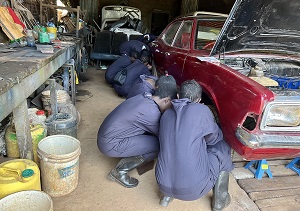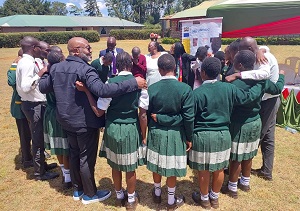Preventing Violent Extremism in Kenya
Your are here : Home / What We Do / CPCJ
Overview
- Project title: Preventing Violent Extremism through Rehabilitation, Vocational Training and Social Reintegration in Children’s Statutory Institutions in Kenya
- Government partner: Directorate of Children Services
- Total project budget: KES 267.3 million (CAD 2.8 million)
- Timeframe: December 2020 – March 2024
This project’s overall objective is to reduce recidivism and radicalization to violent extremism among child and youth offenders in Kenya to improve safety and security.
 Effective rehabilitation and social reintegration programmes help young offenders face multiple challenges, such as stigmatization and victimization. Without these programmes, the likelihood of successful social reintegration is poor and the risk of recidivism is high.
Effective rehabilitation and social reintegration programmes help young offenders face multiple challenges, such as stigmatization and victimization. Without these programmes, the likelihood of successful social reintegration is poor and the risk of recidivism is high.
The UN Standard Minimum Rules for the Administration of Juvenile Justice ("The Beijing Rules"26.1) indicate that the objective of training and treatment of juveniles placed in institutions is to provide care, protection, education and vocational skills, with a view to assisting them to assume socially constructive and productive roles in society.
UNODC follows a rehabilitative pathway to prevent radicalization and effective management of violent extremism in correctional facilities and reduce recidivism after child or youth offenders are released. Our approach is based upon respectful treatment, human rights, opportunities to learn new educational and vocational skills, harnessing family, and establishing post-release supports. These include empowerment programmes, psychosocial support and community partnerships.
Among the project’s desired outcomes, staff at Children’s Statutory Institutions in Kenya are being equipped with the knowledge and skills to manage child and youth offenders, as well as address the challenges of radicalization and violent extremism.
Context
 The project is also contributing to the Government of Kenya’s response strategies to COVID-19, especially the impacts on vulnerable people in society, such as women, children and youth. Addressing the rise in Sexual and Gender-Based Violence (SGBV) cases and petty crimes which occurred as a result of curfews, restricted movement between counties, temporary school closures and other measures put in place in 2020 and 2021 is one focus areas.
The project is also contributing to the Government of Kenya’s response strategies to COVID-19, especially the impacts on vulnerable people in society, such as women, children and youth. Addressing the rise in Sexual and Gender-Based Violence (SGBV) cases and petty crimes which occurred as a result of curfews, restricted movement between counties, temporary school closures and other measures put in place in 2020 and 2021 is one focus areas.
 Progress will also be made towards the Sustainable Development Goals, mainly SDG 16 and SDG 5, and other global goals as indicated below.
Progress will also be made towards the Sustainable Development Goals, mainly SDG 16 and SDG 5, and other global goals as indicated below.
The pandemic has also put many families further behind, for example, due to job losses leading to social problems, such as school dropouts, and opened up avenues for recruitment into crime and terrorism. In addition, as a result of the pandemic, drivers to violent extremism have been exacerbated in areas identified as epicentres of radicalization, such as Nairobi, Mombasa, Kwale and Kilifi.
 Global Affairs Canada
Global Affairs Canada
This project is funded under the Countering Violent Extremism priority area within the Counter Terrorism Capacity Building Programme of Global Affairs Canada. We thank them for their support.
Activities
 a. Educational and vocational interventions: Our interventions consider the needs and aspirations of the offender, as well as the social and economic environment in which reintegration will occur, with the aim of reducing levels of vulnerability and promoting self-sufficiency in the life of the child or young offender. Addressing basic rights through educational and vocational opportunities curtails the conditions conducive to future grievances, violence and crime, thereby reducing such serious risks to society.
a. Educational and vocational interventions: Our interventions consider the needs and aspirations of the offender, as well as the social and economic environment in which reintegration will occur, with the aim of reducing levels of vulnerability and promoting self-sufficiency in the life of the child or young offender. Addressing basic rights through educational and vocational opportunities curtails the conditions conducive to future grievances, violence and crime, thereby reducing such serious risks to society.
Thus, the project is in line with the government’s policy on Technical and Vocational Education and Training which focuses on providing skills that meet the needs of the workplace as well as self-employment.
 b. Return to family and community life: This focuses on community-based post-release checks including assessment of reintegration needs for exit preparation, empowerment initiatives; and establishment of outreach programs to link interested girls and boys to secondary education and or further vocational training and employment in partnership with the private sector and the government.
b. Return to family and community life: This focuses on community-based post-release checks including assessment of reintegration needs for exit preparation, empowerment initiatives; and establishment of outreach programs to link interested girls and boys to secondary education and or further vocational training and employment in partnership with the private sector and the government.
Noting that any form of crime has a negative impact on the personal life of the child and disrupts his or her relationship to family and community, this process of reintegration in the family and the community endeavours to address conflict, stigma and rebuild a social network for the child.
 c. Health and psychosocial recovery and support: Interventions address the impact of the involvement of the child/youth offender in violent extremist groups, crime and conflict on his or her physical and mental wellbeing, as well as supporting those who are a victim of SGBV. This is done in partnership with local community-based organizations that have strong experience in providing psychosocial support to victims and perpetrators of crime.
c. Health and psychosocial recovery and support: Interventions address the impact of the involvement of the child/youth offender in violent extremist groups, crime and conflict on his or her physical and mental wellbeing, as well as supporting those who are a victim of SGBV. This is done in partnership with local community-based organizations that have strong experience in providing psychosocial support to victims and perpetrators of crime.
d. Strengthening institutional capacity: Tailored training programmes are being developed to improve the capacity of staff at Children’s Statutory Institutions to deal with violent extremism, associated radicalization risks and the protection of at-risk children in contact with the law. Partnerships through which the staff can benefit from training in risk management, security and safety training are being pursued with relevant criminal justice institutions.
 e. Creating and strengthening partnerships: This component aims to ensure that all partners – including the private sector, civil society, non-governmental organizations and the community – play a role in establishing effective rehabilitation and social reintegration programmes for these vulnerable children.
e. Creating and strengthening partnerships: This component aims to ensure that all partners – including the private sector, civil society, non-governmental organizations and the community – play a role in establishing effective rehabilitation and social reintegration programmes for these vulnerable children.
Resources
- Annual Project Results Report, 31 Dec 2022 - (Directorate of Children Services)
- Annual Project Results Report, 31 Dec 2022 - (Lang'ata Women's Prison)
- Annual Project Results Report, 31 Dec 2021

